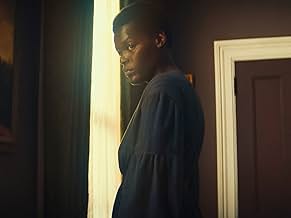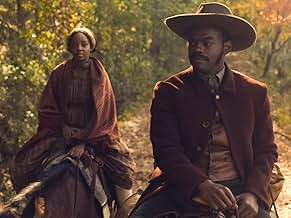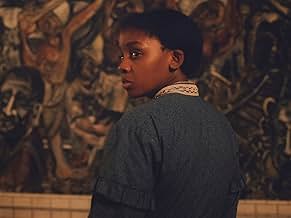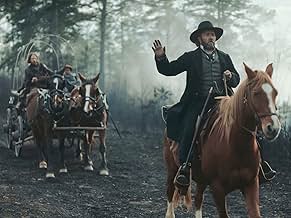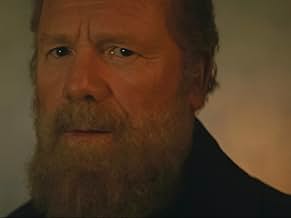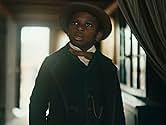Eine junge Frau namens Cora macht bei ihrem Versuch, sich aus der Sklaverei im tiefen Süden zu befreien, eine erstaunliche Entdeckung.Eine junge Frau namens Cora macht bei ihrem Versuch, sich aus der Sklaverei im tiefen Süden zu befreien, eine erstaunliche Entdeckung.Eine junge Frau namens Cora macht bei ihrem Versuch, sich aus der Sklaverei im tiefen Süden zu befreien, eine erstaunliche Entdeckung.
- Für 7 Primetime Emmys nominiert
- 15 Gewinne & 63 Nominierungen insgesamt
Folgen durchsuchen
Zusammenfassung
Reviewers say 'The Underground Railroad' is acclaimed for its storytelling, visuals, and performances, especially Thuso Mbedu and Joel Edgerton. It is celebrated for emotional depth and world-building, blending historical and magical realism. Criticisms include historical inaccuracies, slow pacing, and dramatic scenes. Viewers are divided on its artistic liberties versus historical representation. Despite this, many find it impactful, highlighting slavery's horrors and character resilience.
Empfohlene Bewertungen
First of all, I was a bit shocked to see this rated PG. It should have been at the very least a 12. The first episode, especially, is very gritty with some disturbing scenes. Perhaps not at graphic as some shows today, but still not for children, IMHO.
Secondly, after the gripping first 2 episodes, this becomes very, very slow, with scenes stretched out for far, too long.
I didn't mind the flashbacks, but it would have been so much better if the pace had been faster, rather than showing everything in excruciating detail.
Thirdly, I know it wasn't supposed to be historically accurate, but having actual trains running underground with no-one up above ever hearing or finding them was too far-fetched, never mind how long it would have taken to dig the tunnels and steal a train to run down there!
Also, not all whites were abusers, even in the deep South. Many hated slavery and helped a lot of slaves to escape to the North, but in this portrayal almost all whites are bad and use the 'N' word far, too often.
The program did, however, show how slaves were treated as less than nothing. Property to be used and disposed of on a whim. Sometimes it's easy to forget just how bad it was.
All-in-all it was watchable, but slow-paced, far-fetched and graphic in parts.
Secondly, after the gripping first 2 episodes, this becomes very, very slow, with scenes stretched out for far, too long.
I didn't mind the flashbacks, but it would have been so much better if the pace had been faster, rather than showing everything in excruciating detail.
Thirdly, I know it wasn't supposed to be historically accurate, but having actual trains running underground with no-one up above ever hearing or finding them was too far-fetched, never mind how long it would have taken to dig the tunnels and steal a train to run down there!
Also, not all whites were abusers, even in the deep South. Many hated slavery and helped a lot of slaves to escape to the North, but in this portrayal almost all whites are bad and use the 'N' word far, too often.
The program did, however, show how slaves were treated as less than nothing. Property to be used and disposed of on a whim. Sometimes it's easy to forget just how bad it was.
All-in-all it was watchable, but slow-paced, far-fetched and graphic in parts.
The wife and I are 5 episodes in and so far its excellent, but there's a few things you should know before jumping in, spoiler free.
Number one is this show is not historically accurate in anyway and that's okay, but you should know that. The only true thing about this show is that slavery existed and there was an "underground railroad", but that is not accurately represented.
The Underground Railroad in this show is a literal railroad and in the historical sense it was not, but rather used as a way to secretly communicate the movement of runaway slaves to the north. There are also several other historical inaccuracies, but again that's okay as long as you look at the show as a complete work of fiction that has SOME historical context.
That being said, the show is excellent when you omit historical accuracy. Its a great work of fiction with good acting, cinematography, directing and writing. Very enjoyable and look forward to seeing the end of the story.
Number one is this show is not historically accurate in anyway and that's okay, but you should know that. The only true thing about this show is that slavery existed and there was an "underground railroad", but that is not accurately represented.
The Underground Railroad in this show is a literal railroad and in the historical sense it was not, but rather used as a way to secretly communicate the movement of runaway slaves to the north. There are also several other historical inaccuracies, but again that's okay as long as you look at the show as a complete work of fiction that has SOME historical context.
That being said, the show is excellent when you omit historical accuracy. Its a great work of fiction with good acting, cinematography, directing and writing. Very enjoyable and look forward to seeing the end of the story.
When I read Colson Whitehead's "Underground Railroad" book, I was impressed by the author's ability to capture the essence--both physically and emotionally--of the institution of slavery in the United States. Unfortunately, this Barry Jenkins TV adaptation didn't do nearly as much of that for me.
For a very basic overview, "The Underground Railroad" tells the story of Cora (Thuso Mbedu), a young woman slave who escapes her Georgia plantation via the help of the Underground Railroad of yore. But in this story, the locomotive is literal as opposed to metaphorical. While continuing to head towards free country, Cora makes numerous stops in varying locales, experiencing the different ways in which African-Americans are treated. All the while, she is pursued by Ridgeway (Joel Edgerton), a slave bounty-hunter with a complicated past of his own.
From a production value standpoint, there isn't much wrong with "Underground Railroad". It clearly takes it mission very seriously (almost too seriously, in all honesty) and puts to the screen a gritty, realistic vision of Cora's life and times. In other words, I see where a supreme effort was made by all involved to elevate this to classic status.
But as I hinted, it also seemed like everything here was trying "a bit too hard", so to speak. To the point where I never felt like I emotionally connected with much of the material. For example...
-The acting seems fine, in a technical sense, but it never once "goes for the throat" in terms of really trying to make a point or punctuate an emotion. It almost exclusively tries to rely on the visuals and realism of the scenes playing out.
-Cora's journey is supposed to be broad and intriguing, but here it feels disjointed and scattered. Her time with Caesar (Aaron Pierre) and her time with Royal (William Jackson Harper) are indeed unique, but I never saw--in the end--how they dovetailed with each other.
-A decent amount of time is spent giving Ridgeway a daddy-issues (played by Peter Mullan) backstory, and theoretically that should all work. But the slave-catcher's deeds are so despicable and maniacal that I found it difficult to feel for him on any level other than "villain of the piece".
-A plot thread involving Cora's mother Mabel (Sheila Atim) is used to end the proceedings, and fell completely flat for me. This was clearly supposed to provide the emotional end-punch of the whole series, but again more just muddied the waters for this viewer.
About halfway through "Underground Railroad", I had it pegged as 7/10 stars. But after that point, it had little further ground to trod and the endgame didn't compel me to put all the emotional pieces together (hence the middling 5/10 final rating land).
Of course, I'll always wonder if "Underground Railroad" would have hit different for all viewers had it not debuted during the teeth of a global pandemic. This is a miniseries that doesn't go down easily from a physical or emotional perspective, and perhaps a weary nation wasn't in the mood for such a thing. All told, this is one that ultimately didn't have much of an impact on me one way or the other.
For a very basic overview, "The Underground Railroad" tells the story of Cora (Thuso Mbedu), a young woman slave who escapes her Georgia plantation via the help of the Underground Railroad of yore. But in this story, the locomotive is literal as opposed to metaphorical. While continuing to head towards free country, Cora makes numerous stops in varying locales, experiencing the different ways in which African-Americans are treated. All the while, she is pursued by Ridgeway (Joel Edgerton), a slave bounty-hunter with a complicated past of his own.
From a production value standpoint, there isn't much wrong with "Underground Railroad". It clearly takes it mission very seriously (almost too seriously, in all honesty) and puts to the screen a gritty, realistic vision of Cora's life and times. In other words, I see where a supreme effort was made by all involved to elevate this to classic status.
But as I hinted, it also seemed like everything here was trying "a bit too hard", so to speak. To the point where I never felt like I emotionally connected with much of the material. For example...
-The acting seems fine, in a technical sense, but it never once "goes for the throat" in terms of really trying to make a point or punctuate an emotion. It almost exclusively tries to rely on the visuals and realism of the scenes playing out.
-Cora's journey is supposed to be broad and intriguing, but here it feels disjointed and scattered. Her time with Caesar (Aaron Pierre) and her time with Royal (William Jackson Harper) are indeed unique, but I never saw--in the end--how they dovetailed with each other.
-A decent amount of time is spent giving Ridgeway a daddy-issues (played by Peter Mullan) backstory, and theoretically that should all work. But the slave-catcher's deeds are so despicable and maniacal that I found it difficult to feel for him on any level other than "villain of the piece".
-A plot thread involving Cora's mother Mabel (Sheila Atim) is used to end the proceedings, and fell completely flat for me. This was clearly supposed to provide the emotional end-punch of the whole series, but again more just muddied the waters for this viewer.
About halfway through "Underground Railroad", I had it pegged as 7/10 stars. But after that point, it had little further ground to trod and the endgame didn't compel me to put all the emotional pieces together (hence the middling 5/10 final rating land).
Of course, I'll always wonder if "Underground Railroad" would have hit different for all viewers had it not debuted during the teeth of a global pandemic. This is a miniseries that doesn't go down easily from a physical or emotional perspective, and perhaps a weary nation wasn't in the mood for such a thing. All told, this is one that ultimately didn't have much of an impact on me one way or the other.
The enormously well-received series starts strong with an incredibly powerful pilot episode, and a very interesting second one. But that's where the charm ends, and the show becomes obsessed with incredibly boring white characters. I dragged it out till episode 8 so far, and will definitely finish the show - but I think it should just have ended at Episode 2.
Arnold Ridgeway - the most pathetically boring character invented in 2021.
Arnold Ridgeway - the most pathetically boring character invented in 2021.
Barry Jenkins does what he does best! Beautiful cinematography, amazing score, excellent casting and acting, the pace is deliberate (if not a bit slow). Stand out episodes South Carolina, Fannie Briggs (for the cinematography), Indiana Winter (whew). I love that there aren't any standout stars to distract you as well....that being said you will see a lot for this cast in the future. I definitely recommend but I don't think you should binge it. The subject matter is heavy and you need to allow time to absorb the subtle details.
Wusstest du schon
- WissenswertesThe "Underground Railroad" as a train/railroad had never really existed. That name describes a network of secret routes and safe houses during the 19th century across the Eastern Seaboard of the United States of America. The "railroad" helped enslaved African Americans escape to Northern states, and, after the Fugitive Slave Act, to Canada. The first literal subway/tube/underground railroad was built in London, England, in 1863, while America was embroiled in the Civil War to end slavery.
- VerbindungenFeatured in Late Night with Seth Meyers: Joel Edgerton/Edward-Isaac Dovere (2021)
Top-Auswahl
Melde dich zum Bewerten an und greife auf die Watchlist für personalisierte Empfehlungen zu.
- How many seasons does The Underground Railroad have?Powered by Alexa
Details
- Laufzeit59 Minuten
- Farbe
- Sound-Mix
- Seitenverhältnis
- 1.78 : 1
Zu dieser Seite beitragen
Bearbeitung vorschlagen oder fehlenden Inhalt hinzufügen







